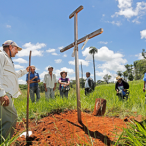English · Español

22 de junio de 2015 | Testimonios | No al golpe de estado en Paraguay | Derechos humanos | Soberanía Alimentaria
Three years after the Curuguaty massacre, Paraguay: testimony of Martina Paredes, sister of murdered peasants
Descargar: MP3 (2.2 MB)
Last June 12 marked three years since the massacre of Paraguayan peasants who were occupying a piece of land in Marina kue, Curuguaty, and which resulted in the Coup d´Etat against Fernando Lugo´s administration, followed by the conservative restoration today led by President Horacio Cartes.
But at judicial level, the case continues to be delayed: the hearing scheduled for this week was suspended until the end of July.
According to a report by the Paraguayan Human Rights Coordination, Marina Kue is "a case that represents on its own the history of ill-gotten lands in Paraguay. The case is an example of the institutional dynamics of public heritage theft and how the economic and political interests over the territory are connected".
The lands in question are two thousand hectares claimed by the peasants who had belonged to La Industrial Paraguaya company which were then donated to the Paraguayan Navy to establish a base there. "The donation was accepted and the land was effectively occupied by a Navy detachment which was operational until the end of 1999”.
Then the land was demarcated. However, the transfer of the property titles never took place due to bureaucratic issues. The report also states: "Through the intervention and mobilization of a peasant organization, in 2004 the lands were transferred to INDERT (National Rural Development and Land Institute) and were declared of social interest with agrarian reform purposes.
While INDERT was carrying out different proceedings to make the title transfer effective, the company Campos Morombi SA, owned by politician and businessman Blas N. Riquelme, was granted in an unprecedented short amount of time ownership titles. In a fraudulent process, Judge Carlos Goiburu of Curuguaty granted Riquelme the rights over the donated lands. “The Riquelme family owns approximately 70,000 hectares of lands, among the lands bought to LIPSA and others assigned by the IBR as ill-gotten lands".
The massacre took place in a political context of pressure by biotech companies such as Monsanto, and mining companies such as Rio Tinto ALCAN which were seeking permits by the Paraguayan State. Fifteen peasants and one police officer died during the massacre.
Martina Paredes lives four kilometers from where the events took place. Two of her brothers (Fermin and Luis Agustin) died in the massacre. Real World Radio interviewed Paredes, where she denounced the judicial system that criminalizes peasants without evidence of them being responsible for the violence that day.
More information at:
http://quepasoencuruguaty.org/
Imagen: viacampesina.org








